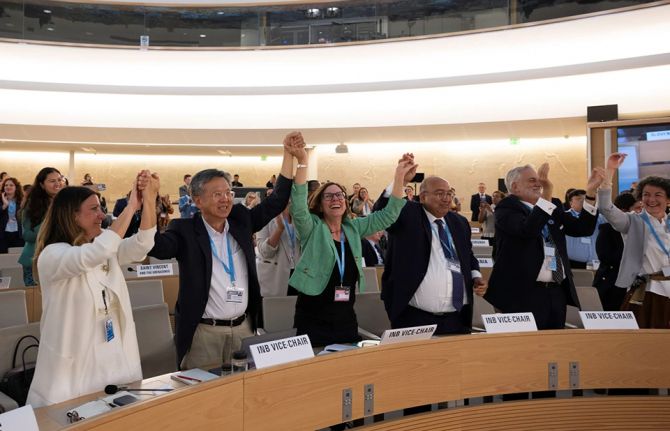

Press Release
UNAIDS welcomes WHO Pandemic Agreement
20 May 2025 20 May 2025Governments at the 78th annual World Health Assembly have adopted a global Pandemic Agreement. The Joint United Nations Programme on HIV/AIDS (UNAIDS) and other stakeholders played an important role in supporting the process by advocating for an agreement that centres equity and human rights.
Responding to the news, Winnie Byanyima, Executive Director of UNAIDS, said:
“Amid the devastating crisis in global health funding, this truly global agreement offers a ray of hope. It is an affirmation that multilateralism remains possible, and indeed the only way to fight the viruses that exploit global divisions but refuse to respect borders.
I congratulate South Africa and France as Co-Chairs; Australia, Brazil, Egypt and Thailand as Vice-Chairs—each representing their region—and WHO Director-General Dr Tedros for this landmark achievement.
The text is a commitment that global equitable access will be a guiding principle in pandemic preparedness, prevention and response. Crucially, governments will attach conditions to public funding—which means that, when a pharmaceutical company takes public money, it should come with clear conditions requiring equitable access. And it makes technology transfer a priority.
While the Agreement is a product of compromise—and governments should treat it as a floor, not a ceiling—still, it gives humanity some of the tools needed to ensure the next pandemic does not repeat the horrific inequity of HIV and COVID-19. It is our chance to break the pandemic-inequality cycle—and governments should be bold and swift in their implementation.”
Ms Byanyima will discuss the implications of the Pandemic Agreement on the sidelines of the World Health Assembly at an event organized by the Global Council on Inequality, AIDS and Pandemics on Wednesday 21 May, 08:30 – 10:00 CET. Find out more about UNAIDS’s engagements at #WHA78 here.
UNAIDS
The Joint United Nations Programme on HIV/AIDS (UNAIDS) leads and inspires the world to achieve its shared vision of zero new HIV infections, zero discrimination and zero AIDS-related deaths. UNAIDS unites the efforts of 11 UN organizations—UNHCR, UNICEF, WFP, UNDP, UNFPA, UNODC, UN Women, ILO, UNESCO, WHO and the World Bank—and works closely with global and national partners towards ending the AIDS epidemic by 2030 as part of the Sustainable Development Goals. Learn more at unaids.org and connect with us on Facebook, Twitter, Instagram and YouTube.
